Learn how to install and set up a Jellyfin media server on Ubuntu 22.04 LTS Jammy JellyFish to share your music with friends or play them using a local network or the internet.
When it comes to creating your own Medis server, the first name would be Kodi or Plex, however, these are not only out there. Jellyfin is another popular open-source project that lets us create quickly a modern media server with an interactive web user interface to manage videos, images, and music from any device.
We can browser media content using Jellyfin on various devices such as computers, apps on your Roku, Android, iOS (including AirPlay), Android TV, or Fire TV device, or via your Chromecast or existing Kodi. Whereas when it comes to installing the Jellyfin server platform it doesn’t limit to Linux only, we can set it up on machines running Microsoft Windows, macOS, or in a Docker container.
Steps to install Jellyfin media server on Ubuntu 22.04 LTS Linux
Here we will show the steps to not only install the Jellyyfin media server on Ubuntu 22.04 but also how to configure it to access media content.
1: Add GPG Key
Before adding the Jellyfin repository add its public GPG key used to sign the packages of Jellyfin and will confirm we are getting them to install on our system from the authentic source.
To get packages via a secure protocol, first, enable its support using the below command:
sudo apt install apt-transport-https ca-certificates gnupg2 curl git -yAdd key:
curl -fsSL https://repo.jellyfin.org/ubuntu/jellyfin_team.gpg.key | sudo gpg --dearmor -o /etc/apt/trusted.gpg.d/jellyfin.gpg2: Add Jellyfin Repository
Now, let’s add the Jellyfin repository as per the Debian or Ubuntu-based Linux system you are using. This is a single command, thus you have to copy and paste it whole.
echo "deb [arch=$( dpkg --print-architecture )] https://repo.jellyfin.org/$( awk -F'=' '/^ID=/{ print $NF }' /etc/os-release ) $( awk -F'=' '/^VERSION_CODENAME=/{ print $NF }' /etc/os-release ) main" | sudo tee /etc/apt/sources.list.d/jellyfin.list3: Update Ubuntu 22.04
Rebuild the system’s repo cache, so that it could recognize the added repo and its corresponding packages to install on our system to set up the Jellyfin media server.
sudo apt update4: Install Jellyfin on Ubuntu 22.04
Finally, run the below command to automatically install Jellyfin on your Debian or Ubuntu-based Linux operating system you are using,
sudo apt install jellyfin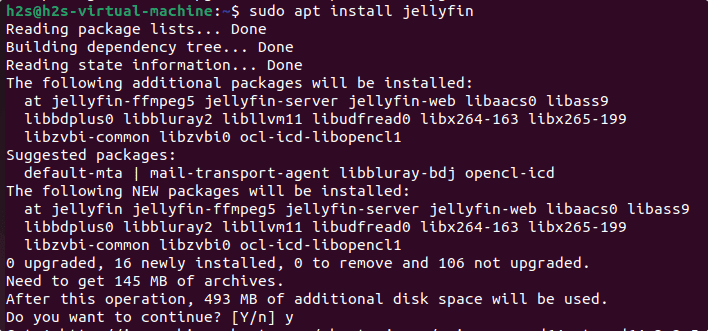
5: Enable and Start Jellyfin Server
Once the installation is completed, let’s start the Jellyfin Media server service on Ubuntu 22.04 and enable the same, so that it could automatically get started with system boot.
sudo systemctl enable jellyfin
sudo systemctl start jellyfinYou can also check whether everything is running properly or not by using :
sudo systemctl status jellyfin --no-pager -l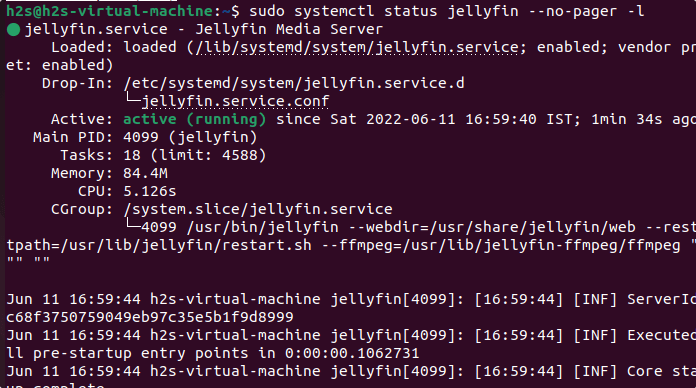
6. Allow media server through a firewall
The default port used by the Jellyfin media server is 8096 and if you are using some firewall such as UFW or those who are using cloud hosting to run Ubuntu 22.04, open this in their firewall.
If you are using an active UFW firewall then use the given command:
sudo ufw allow 80967: Configure Jellyfin media server
As everything is in position, our open-source media server is up and running, thus it is time to let’s access the Jellyfin web interface using the browser. If you are using a command-line server to set it up, then use some other local machine available to access the remote server where you have installed the Jellyfin.
In the browser, type the IP address of the server where Jellyfin has been installed along with port number 8096. Whereas if you are using the Jellyfin installed server in GUI with browser access then we can use localhost or 127.0.0.1.
Example:
127.0.0.1:8096
0r
ip-address:8096
Note: Replace the IP address with your server address.
You will get the welcome screen to set up Jellyfin further.
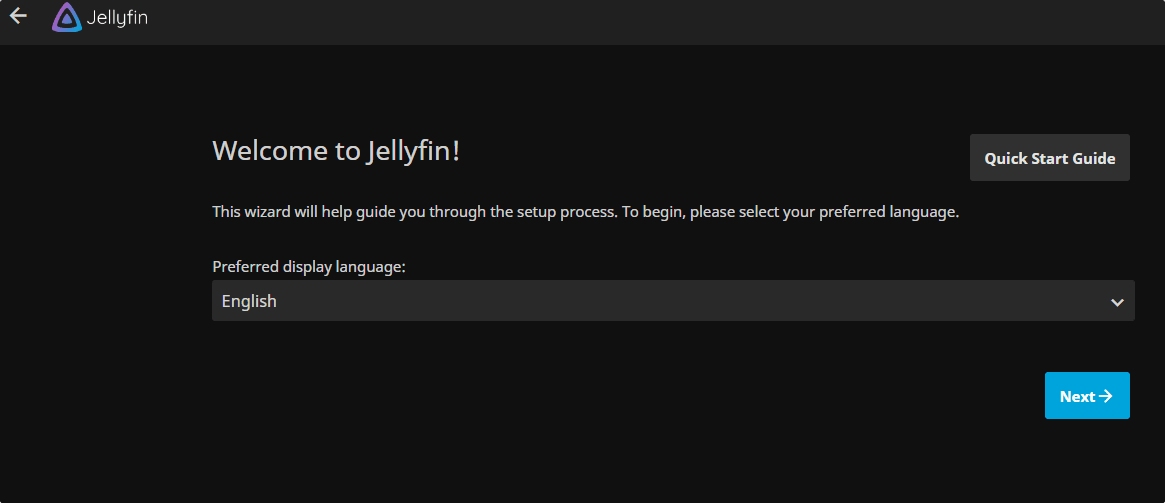
8: Set Username and Password
Click on the Next button to start the Jellyfin media server setup. The next screen will appear for setting up the username and password for Admin that will have all the access to add/remove content and other settings.
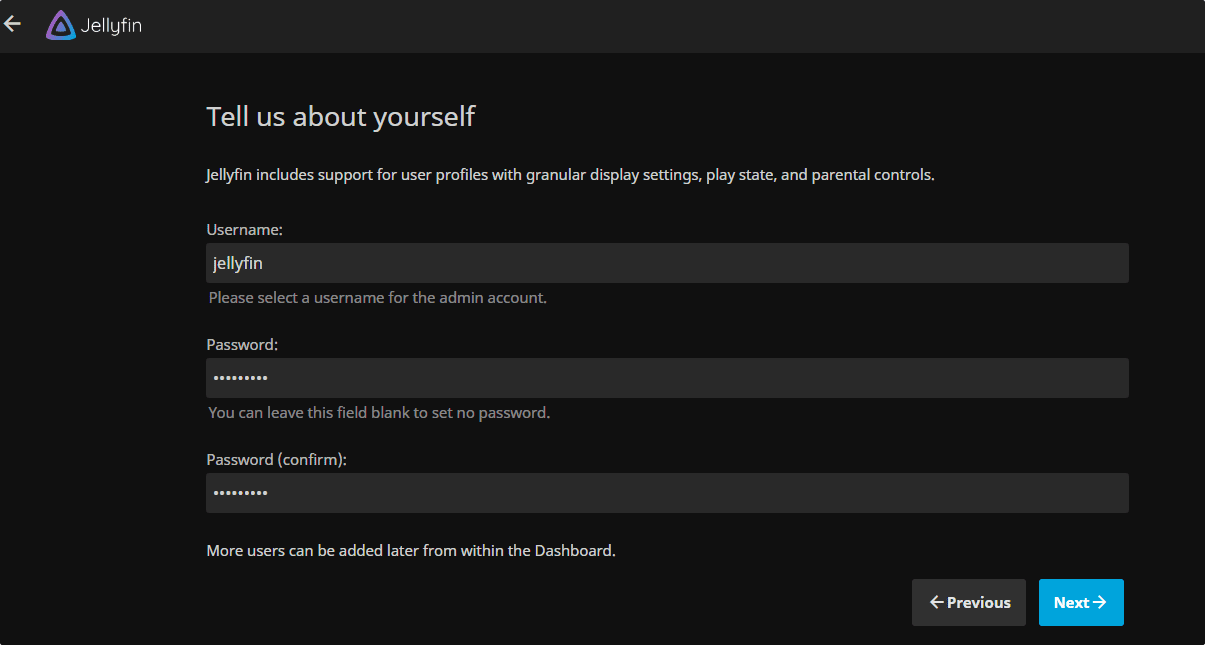
9: Add Library
Click on the + button, first select the category type, for media content files such as music, videos, and images and then type the path of the folder where you have to save the media you want to play on Jellyfin. For example, I selected the Music category and then entered the path of the folder where I have saved my music files.
You can add multiple folders to your library right here or after whenever you want.
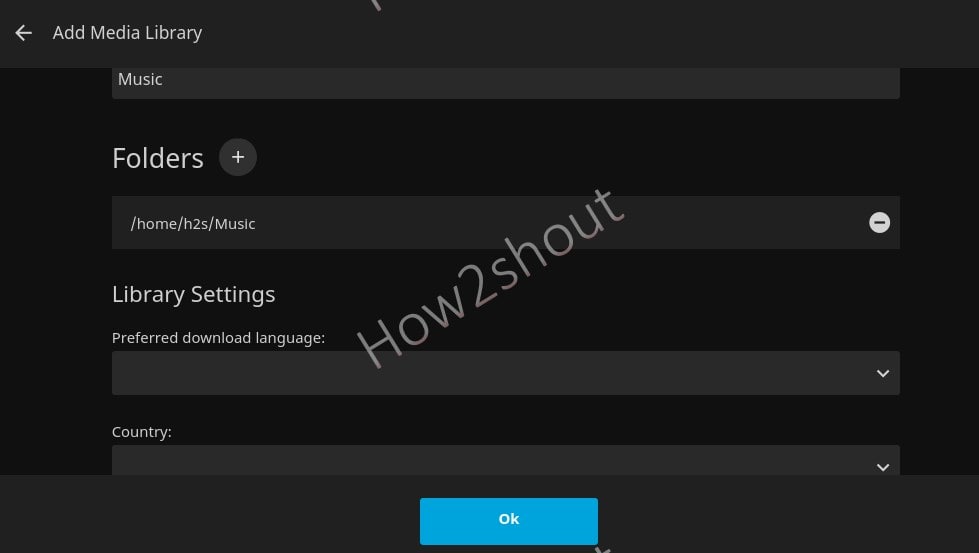
In case you want to use a smartphone and other devices to remotely connect Jellyfin using the internet then enable the “Allow remote connections to this Jellyfin Server” option. However, to access the server residing behind a local router and using a local IP address, to access it via the internet, the user has to forward its Jellyfin port manually.
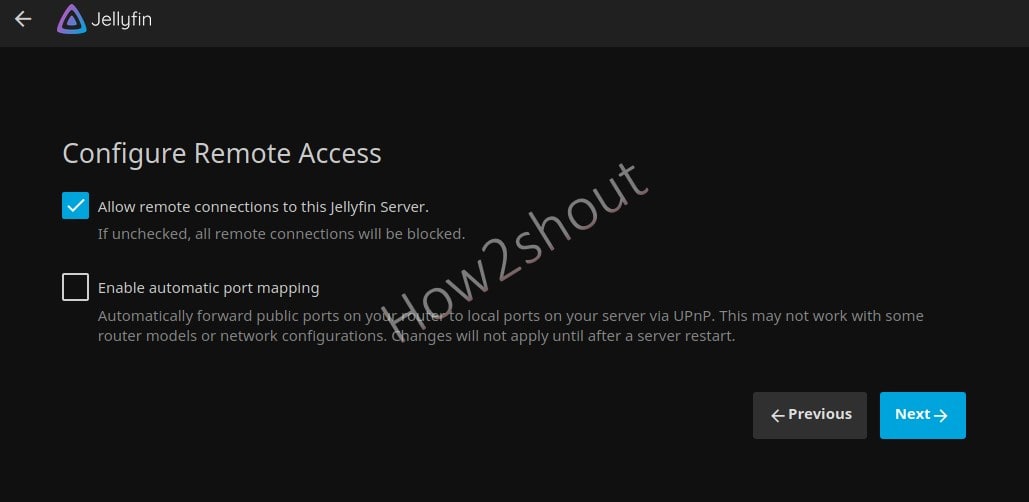
10: Log in to Jellyfin Server
Enter the username and password to log in, and then you will have the Interface of Jellyfin in your browser to access the music, videos, and other media files.
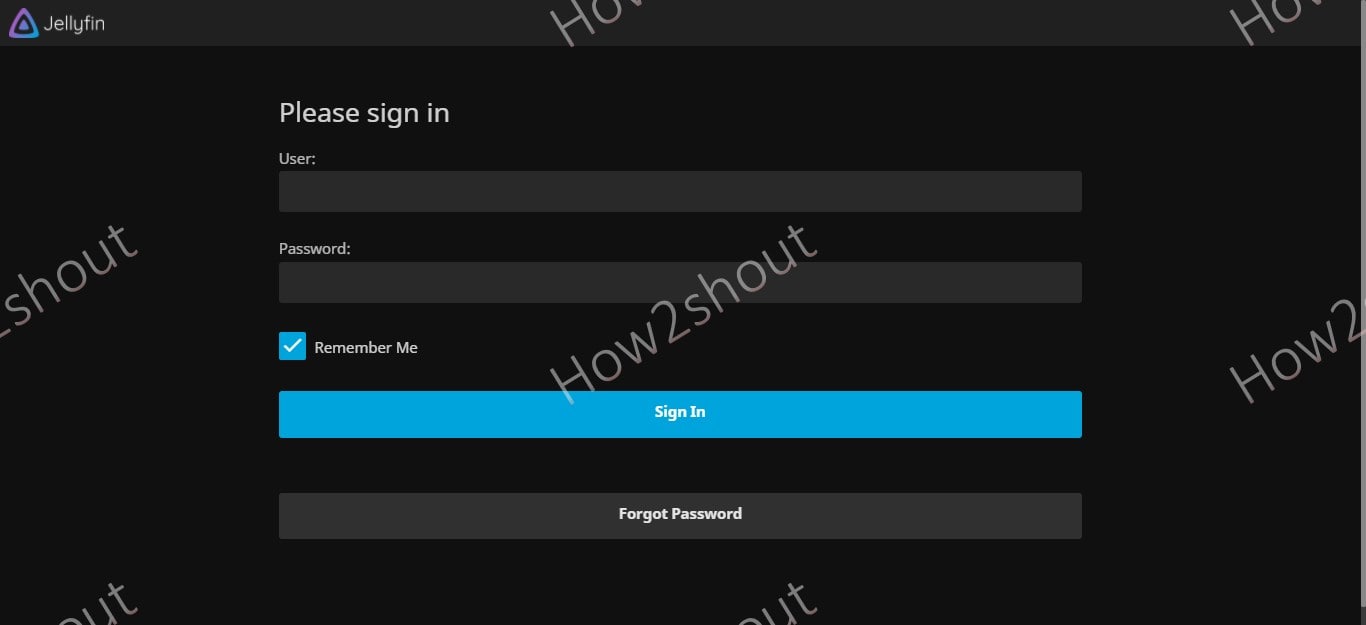
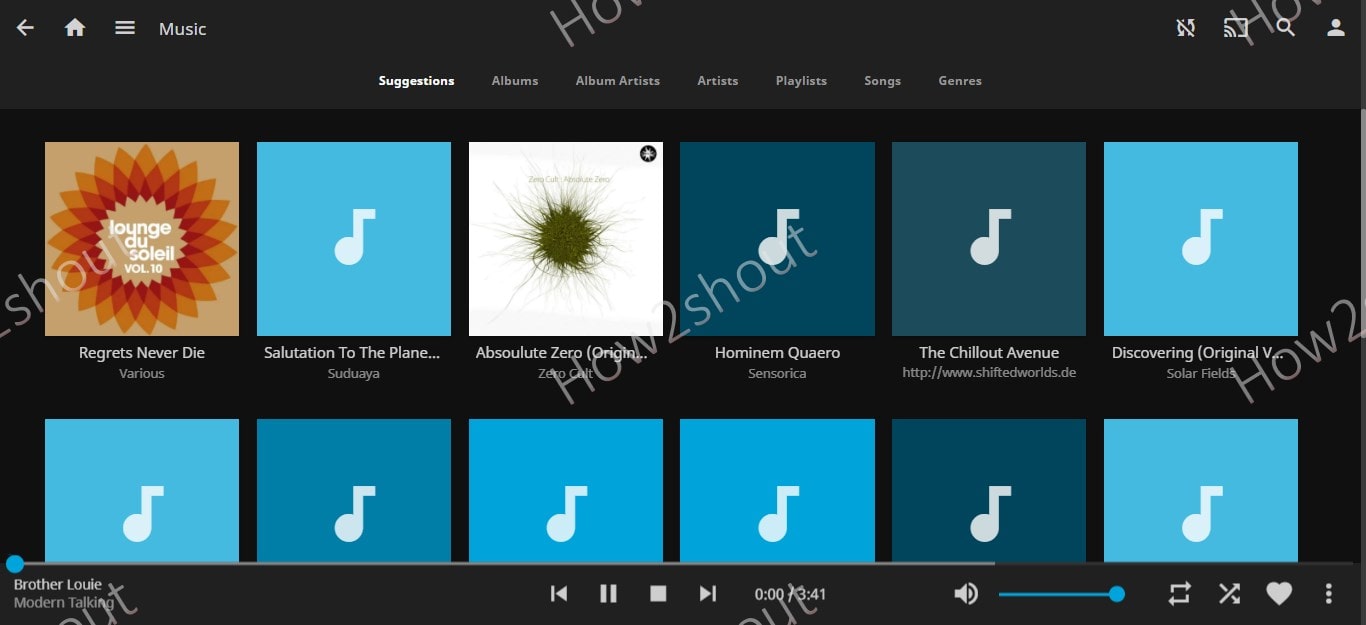
In case you want to add some more Library or media folders in Jellyfin, then go to Dashboard, select libraries, and then “Add Media library”.
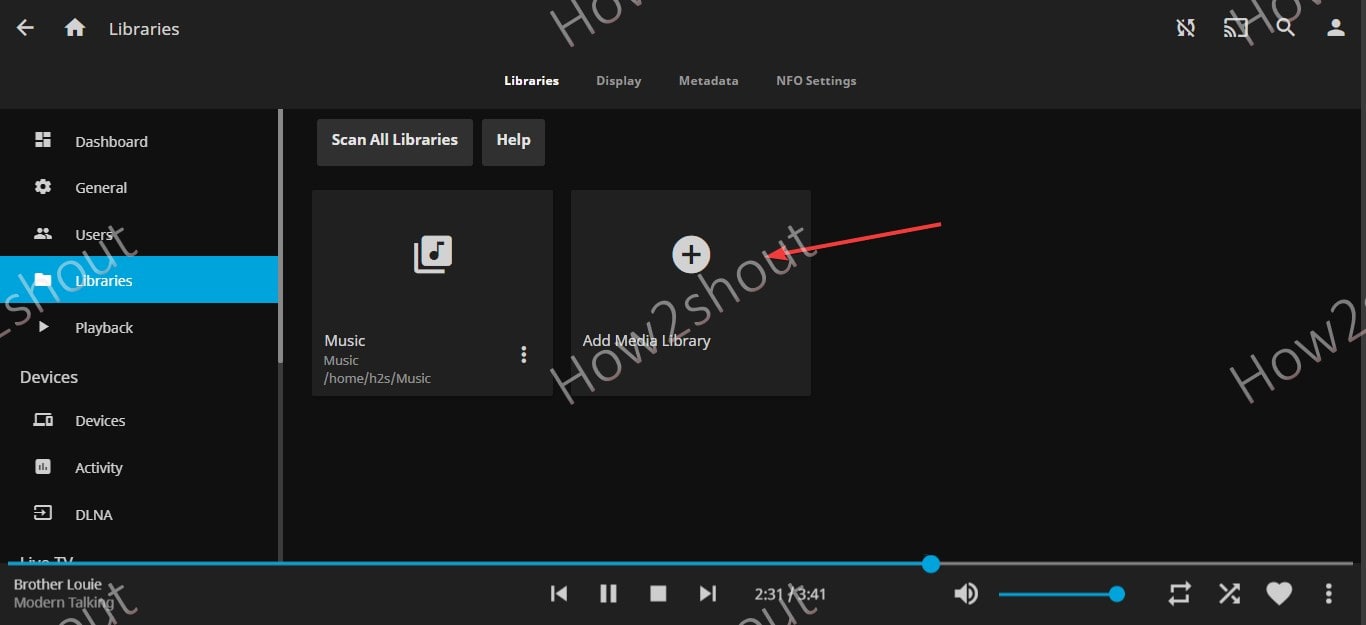
Options to restart and shut down the server are also present under Dashboard.
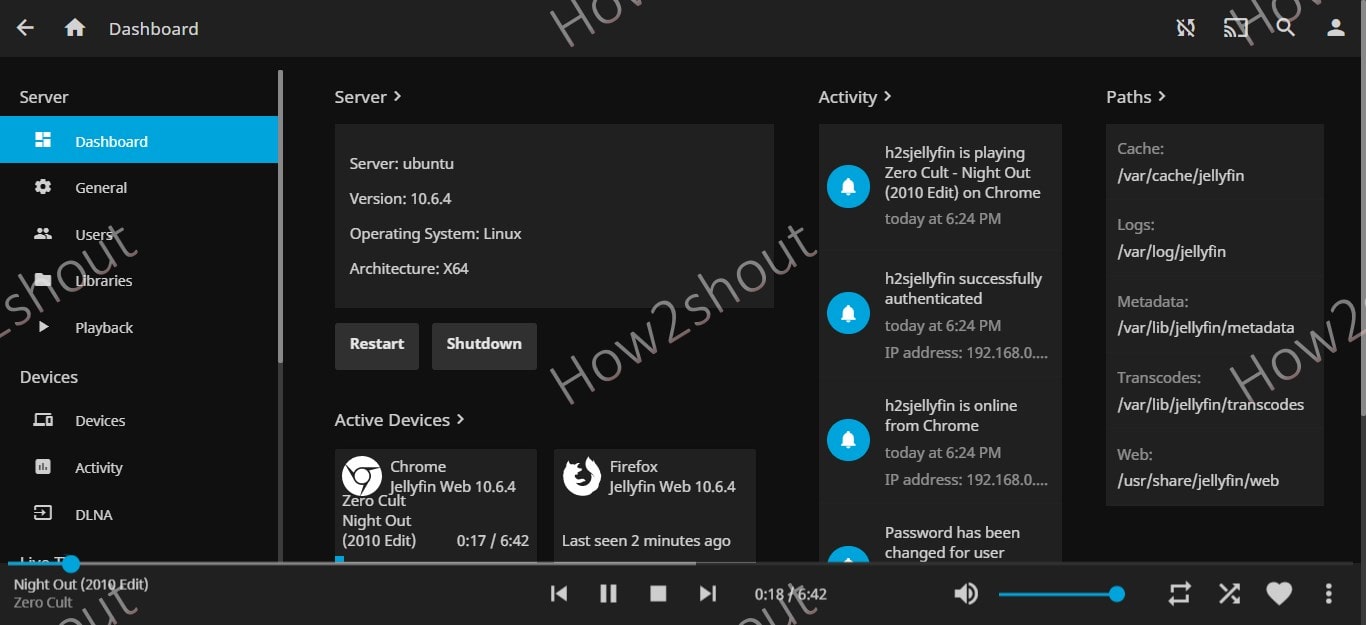
11. How to Update/Upgrade
As we have used the official JellyFin repository to install it, we can use the system update and upgrade command to get the latest available updates.
sudo apt update && sudo apt upgrade12. Uninstall Jellyfin Media Server
Those who are not interested in this open-source media server and want to completely remove it from their Ubuntu 22.04, can go for the given commands.
sudo autoremove install jellyfin --purgeTo remove the repository as well.
sudo rm /etc/apt/sources.list.d/jellyfin.listJellyFin Clients
This open-source media server supports multiple client applications to stream music and videos from the server. Thus, for the same, we can download Jellyfin Client as per our devices such as Firestick, Android TV, iPhone, Kodi, Roku, and more…
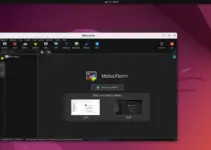
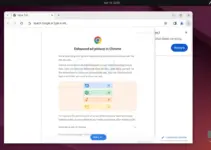


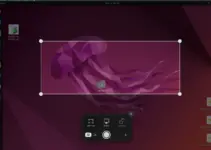
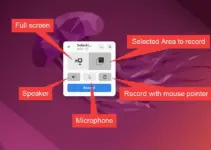
These instructions don’t work. Jellyfin doesn’t support 22.04 and as a result, there’s an error about unmet dependencies when trying to install it. They only support up to 20.04.
Please fix or at the very least, change the 22.04 to 20.04 so time isn’t wasted.
On the official website, it is clearly mentioned that JellyFine supporter Jammy otherwise our system would not have added the repository while testing the software. You can check out https://jellyfin.org/docs/general/installation/linux
It’s working for me, but I have a problem. Whenever I need to install a security update on Ubuntu 22.04, the media server crashes and I have to remove and reinstall the Jellyfin server. There’s any fix to this problem?